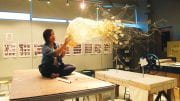Marlisa Santos, professor in the Department of Humanities and Politics and director of the Center for Applied Humanities, believes it is invaluable for students to learn how to successfully communicate.
“The writing that they do in English courses certainly contributes to this skill,” Santos said.
Learning the areas of study in the English discipline, such as writing and literature, can be useful for college students to communicate unique feelings and ideas, understand others’ perspectives and experience humanity through the lens of authors and their writing styles, Santos said.
“The study of literature promotes imagination and empathy where you are put into the shoes of characters,” Santos said. “Literature helps you understand common experiences of humanity, and this kind of understanding makes you a better person and a better citizen, regardless of your profession.”
Santos has been teaching for 29 years, with 23 years as an NSU faculty member.
“My love of literature was the impetus for becoming a professor,” Santos said. “I wanted to inspire students to love it, too, and to show them the power of the written word, which has transformed society since antiquity.”
Kate Waites, an emeritus professor of English who taught at NSU for 34 years until her retirement in 2021, said that the study of literature encapsulates the human experience, by which students gain insight into how human beings interact with one another and make choices that produce consequences. In this way, they are encouraged to place themselves in a character’s shoes and imagine what they might do in a similar situation. Literature encourages self-reflection, a core element of being human.
“I pursued teaching English and literature at the collegiate level because of my love and enthusiasm for literature and how it opens one up to worlds, cultures and experiences of others,” Waites said. “It broadens and deepens students’ worldview and helps students to develop empathy, which is probably the most important, necessary and undervalued of human emotions.”
Santos said that technology has changed the ways of how she initially taught students.
“I believe when I started teaching at NSU, we did not have ceiling projectors or the computer podiums that we do now, so our teaching was paper-based: handouts, hard copies of books and hard copies of student papers,” Santos said. “Now, students, and by extension all of us, have so much more access to information because the internet has developed.”
Santos said projectors, and apps like Canvas, allowed her students to better understand literature.
“Projectors being able to project large videos and images of text for classroom analysis, discussion and annotation has been very helpful because it complements the texts we are reading” Santos said. “Also, being able to electronically give feedback on student papers through Canvas has definitely improved my efficiency and ability to clearly communicate with students.”
Waites changed her traditional lecture approach to discussion-oriented teaching with students and incorporated technology during sessions.
“I learned to incorporate various forms of technology like Canvas, PowerPoint, Zoom, digital boards and hybrid learning,” Waites said.
From lectures to student-centered discussions and using modern technology, these developments affected the way students engaged in learning.
“I have to say that the most effective tool was me in the classroom doing critical analysis of texts together with the students,” Waites said. “It creates a more interactive and fun class that enables students to learn from one another as well as from me.”
Santos said studying literature can help students with their professional careers.
“It helps you to be a creative problem-solver as well as a compassionate co-worker and a responsible employee and leader,” Santos said. “I try to push my students to use their analytical skills to tackle difficult texts that may challenge their reading and critical thinking skills, but also broaden their views beyond their individual experiences.”
This method of student analysis improves skills for their professional careers. Students acquire a fulsome understanding of enhancing their vocabulary, knowledge of different writing techniques, and being expressive in writing through a unique voice, as opposed to manufactured generated text by artificial intelligence.
“Students learn better in how to write by reading and writing about literature” Waites said. “In this way, in addition to learning about the culture behind the text, students develop vocabulary, are exposed to the rich and varied styles and uses of language, and how to think and write critically.”





Be the first to comment on "Professors share their love of literature"